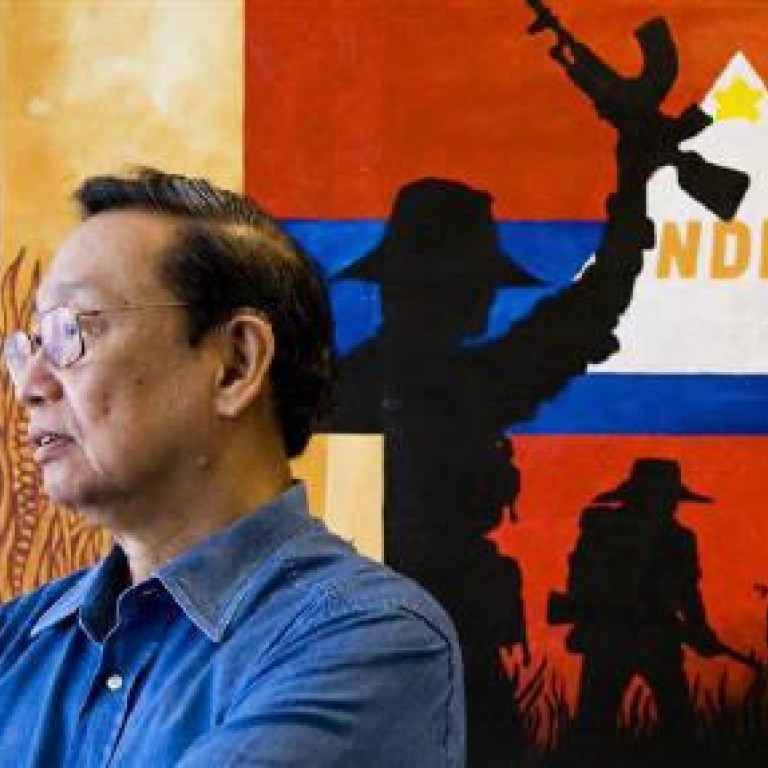
Exiled Philippine communist leader Sison blasts ‘greedy’ China over sea dispute
Communist Party of the Philippines founding chairman Jose Maria Sison has turned on his former benefactor, China, amid the South China Sea territorial dispute between Beijing and Manila.
“China is obviously being greedy, claiming 90 per cent of the South China Sea,” Sison told the South China Morning Post in his office in Utrecht, the Netherlands, 43 years after his fledgling rebellion was secretly sent weapons and cash by China’s late leader, Mao Zedong.
Sison called China’s territorial claims “foolish” and “false” and added that “it would be like India claiming the whole of the Indian Ocean or Mexico claiming all or most of the Gulf of Mexico.”
Sison denied this was a major change in the party’s attitude towards the dispute. “The Communist Party of the Philippines (CPP) has been consistent in asserting national independence and maintaining the territorial integrity and even when there is a coincidence with regard to the national government on territory, the CPP does not mind having the same position as the national government,” he said
“Because if you don’t defend the territory, nothing might be left if you neglect it.”
When Sison broke away from the old Philippine communist party to form his own, his new group - the CPP and its armed wing the New People’s Army (NPA) - adopted Mao’s protracted people’s war.
Despite the fact that Mao established diplomatic relations with dictator Ferdinand Marcos, who had Sison arrested, tortured and tried for rebellion, Sison continues to follow the Maoist doctrine. In fact, he criticises the present Chinese leadership for veering away from Mao’s vision.
“I think the Philippine communist party is more loyal to Mao than the pseudo communists, the fake, the phony communists in China now,” Sison said.
He traced the latter’s abandonment of “real communism” to “the counter-revolution of Deng Xiaoping [which] was quite successful. There was a coup in 1976 and by 1978 the transformation of China into a capitalist society went in earnest. And what you have [today] is a capitalist country.”
When asked whether he could achieve victory in his lifetime, Sison, now 76 and living exile in Utrecht, said: “Maybe you know, I could have died as soon as the party launched the armed struggle [in 1969]. The communist spirit is to ‘do what you can, do your best while you can’.”
His group has had setbacks lately. The central party chairman Benito Tiamzon and his wife Wilma Austria, the party secretary-general, were arrested a year ago. Last month, soldiers killed veteran NPA commander Leoncio Pitao.
Now Sison is offering President Benigno Aquino a truce and peace talks which he hopes would include the release of the Tiamzon couple so they can take part in the peace process.
“The special envoy of the Norwegian government has been kind enough to propose the procedure for making sure that the agreements are made,” Sison said.
He expressed confidence that a truce could be put in place before the year’s end, followed by an agreement on social and political reforms.
“Aquino may want to leave a good legacy [and] I would be happy to strike an agreement to make peace,” he said.
“The agreements can be so worded that only the most reactionary and the most subservient to the narrowest interest of foreign and feudal domination would be against it,” he said.
In an interview with the Post in April, Aquino said of the peace process: “We were exploring that special track that was proposed by Jose Maria Sison. They left the negotiations - the informal track and the formal track. Now, they say they are ready for it again. I think they have to demonstrate sincerity first.”
When pressed whether there was a chance for negotiations to resume, Aquino replied: “I’m having a briefing on that this afternoon.”

